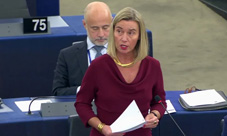
Federica Mogherini delivers a report on Eastern Partnership at a plenary session of the EU Parliament
By Tsotne Pataraia
Friday, November 29
At the European Parliament, Federica Mogherini, the EU High Representative for Foreign Affairs and Security Policy, delivered a report on the Eastern Neighborhood Policy in Strasbourg on November 27.
In her speech Mogherini touched upon the issues regarding political situation in Georgia. According to her, concerning the breakaway South Ossetia, security issues along Georgia's administrative boundary line have deteriorated in recent months and as a result of which, EUMM's presence in the area has increased:
“Conflict has not yet disappeared from our continent. The security situation along the administrative boundary line with the Georgian breakaway region of South Ossetia has worsened in recent months, this is why we are increasing our EU Monitoring Mission’s presence on the ground,” EU’s top diplomat noted.
Underlying commitment and support towards Georgia High Representative rearticulated EU’s firm position of supporting sovereignty and territorial integrity of Georgia:
“Because our support to Georgia’s sovereignty and territorial integrity is not just a statement or declaration of principle, it is the foundation of our daily concrete work on the ground,” Mogherini said.
Speaking about the developments in the EU's Eastern neighborhood Mogherini spoke of the risks in relation to Georgia’s democratic development:
“Today we see the risk in Georgia of backsliding on some important reforms in the rule of law area. Georgia is a close and reliable ally in the neighborhood, in our partnership, and it is precisely why we do not shy away when we see risks,” HR stated.
Following Mogherini's speech, debates were held in which MEPs praised ten years of the Eastern Partnership. Speakers at the debate on Georgia have voiced concern over the political crisis in the country. Participants in the debate called on all political forces to find ways to resolve the problem politically. Some speakers say the responsibility lies with the government, which has not fulfilled its promise of proportional elections.
Speaking in the European Parliament, Former Prime Minister of Lithuania and Member of the European Parliament Andrius Kubilius said that recent developments in Georgia have raised questions about the country's democratic future:
“The developments in Georgia raise our concerns about the country's democratic future. One thing is clear, if there is no democracy, no integration is possible. he Chairman of the ruling party of Georgia has not fulfilled the promise made to the citizens to introduce a proportional electoral system ... The ruling party did not fulfill the promise because it was afraid that it would lose the elections through the proportional system. What conclusion can we draw from this? It may be that the ruling party is going to resort to old administrative tricks to win the election,” Kobilius said.
Federica Mogherini, whose five-year term expires and is going to leave the post, noted in her report about the success of the ten-year Eastern Partnership program. In this context, Ukraine, Georgia and Moldova were mentioned as leaders of the partnership project having a visa-free regime with the EU, although special praise was directed to Armenia, where, as Mogherini says, the government has been on the path of significant democratic reforms since the revolution.
MEPs in the debate stated that it is necessary to continue the partnership and bring it to a qualitatively new level. A number of speakers have called for the EU to develop a differentiated approach in its relations with Eastern partners. According to Polish MP Witold Waszczykowski, the prospect of eventual membership for successful partners would play a catalyst for accelerating reforms.


